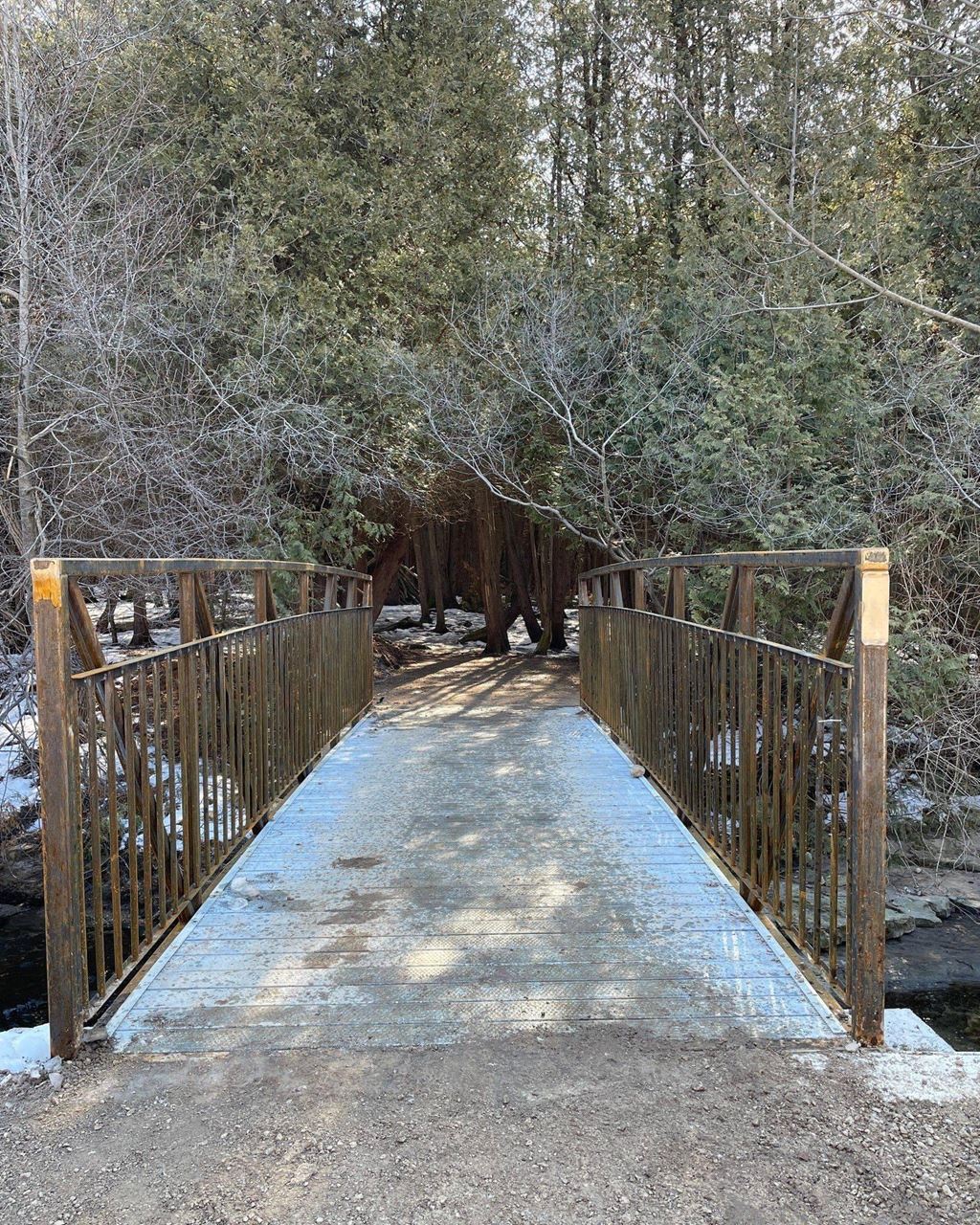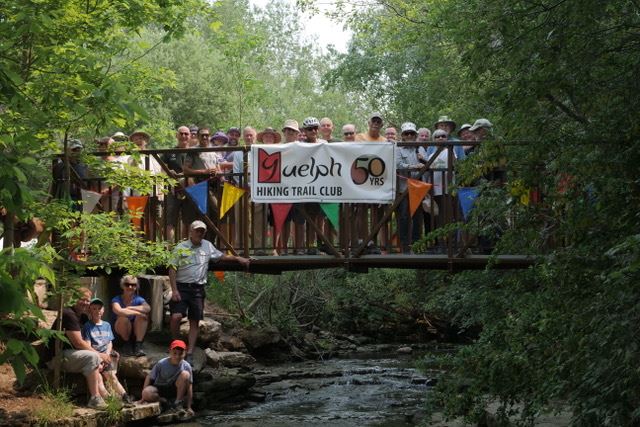|
- Home
- Trails
- Year of the Bridges
- Crane Park Community Bridge
Crane Park Community Bridge
By Liam Waterman, GHTC Volunteer

See more photos here!
The Crane Park Community Bridge is a 25 foot steel bridge connecting the paths through Crane Park and the off-leash Crane Dog Park to a series of unofficial trails following the eastern side of the Speed River.1 The bridge, which was constructed as a 50th anniversary legacy project for the Guelph Hiking Trail Club (GHTC), spans a storm water channel that had formerly separated these two trail systems. Although many runners and hikers were already in the habit of crossing this stream via low lying stones prior to the installation of the bridge, the crossing was not accessible for individuals with limited mobility, and frequently became treacherous in the spring and winter when the rocks could become particularly slippery. As the second of the GHTC’s bridge fundraising projects organized under the leadership of John Fisher, the existence of this bridge is in large part owed to a number of generous contributions from local donors.2
The GHTC’s plans to construct the Crane Park Community Bridge began in 2021, after the successful installation of the very similar Gosling Bridge on the James St. Trail. This bridge project, which also entailed a community fundraising campaign, saw the GHTC engaged in frequent communication with staff from the City of Guelph, who had raised some concerns during the bridge building process regarding the proposed location. The GHTC has since been seeking to maintain a positive relationship with the City, and in 2021, Bob Bell, then city councilor, reached out to the GHTC regarding a new prospective bridge project of a similar character to the Gosling Bridge. A local resident, who prefers to remain anonymous, had been trying for some years to have a bridge installed connecting the trails along the Speed River with the path through Crane Park. He had been working with Jack Tacoma of the local engineering consulting firm Tacoma Engineers, with plans of installing a wooden bridge at the location. Unfortunately, he had been unable to complete the project. Bob Bell informed John Fisher that this anonymous resident would be willing to donate $25,000 dollars of “seed money” in order to get a bridge project underway. Fisher knew the GHTC would be able to bring to the project both their experience in acquiring permits and in working with the City. “We know how to make things happen,” John Fisher would later say to a reporter from the Guelph Today.3
After consideration, John Fisher and the GHTC executives agreed to undertake the bridge building project at Crane Park, deciding that installing such a connection would fit with the club’s future plans for a trail system on the eastern side of that section of the Speed River. Further downriver from Crane Park are the “Niska Land Holdings,” a section of land including the former Niska Waterfowl Park, currently owned by the Grand River Conservation Authority (GRCA). The GRCA plans to open these lands to the public via a recreational trail sometime in the near future.4 This proposed trail connection is becoming increasingly urgent as new housing continues to be put in in the surrounding area. When the land is finally open, John Fisher expects the GHTC will be able to install a trail down the Speed River leading into the Niska Land Holdings, which would be accessible via Crane Park. A bridge over the storm water channel at Crane Park, the GHTC decided, would constitute a kind of first step towards creating this official connection. At the very least the $25,000 provided as seed money would cover the cost of abutments for the bridge, allowing the GHTC to make some kind of progress towards this goal.
Since Crane Park is owned by the City of Guelph, the GHTC began the project by asking Gene Matthews, the current General Manager for Parks with the City of Guelph, to come and survey the site. With Matthews’ support, the GHTC were able to procure all the necessary permissions to install a bridge over the channel. By the end of May 2022 the club was ready to go ahead with the project.5 For the design and construction of the bridge itself, the GHTC elected to go to Eagle Bridges Inc, a Kitchener-based company which had produced several steel bridges for the club in the past, including the aforementioned Gosling Bridge. Eagle Bridges are commonly utilized for trails in the Guelph and Kitchener-Waterloo area, and their use of Corten steel, which quickly forms a thin protective rust layer, makes them particularly resistant to water damage. Eagle Bridges Inc. also personally handles the delivery and installation of their bridges, making the bridge construction process significantly easier for volunteer organizations like the GHTC.
Financial support for this Eagle bridge, which was initially projected to cost a total of $60,000, was procured through a local community fundraising campaign. This campaign involved placing some limited signage and posters regarding the project in the area, along with an online ad posted via Canada Helps. In addition to the $25,000 of seed money from the anonymous local resident, an early donation of $10,000 from two GHTC members helped the fundraising campaign to get off the ground. Further donations trickled in over the course of the bridges’ construction and installation, including a grant of $2,000 from the Rotary Trillium Club in Guelph. The GHTC reached their eventual goal of $65,000 around early spring 2023.6
Construction on the bridge began with the installation of abutments on either side of the channel, which needed to be completed before the bridge could be ordered. This work was undertaken by the crew of Richard Charity, the same contractor who had constructed the abutments for the Gosling Bridge. The work involved digging out large rectangular trenches on either side of the stream, and then pouring concrete to create two large slabs onto which the bridge could eventually be bolted. Unfortunately Charity was not initially able to fit this work into his professional schedule, delaying the construction of the abutments until August 2022. The GHTC still believed at this time that the bridge could be finished by the end of the year, leading to the tagline “bridge by Christmas”. However, Eagle Bridges Inc. was also significantly delayed, meaning that the bridge was only finally brought into place in January 2023.
On the day of installation the City of Guelph closed off a section of Crane Park, allowing the bridge to be brought to location by Eagle Bridges Inc. on the back of a flatbed truck, along with a crane, which would be used to lift the bridge onto its abutments. John Fisher was recovering from knee surgery at the time, so Lorenz Calgano, the former project manager for the Gosling Bridge and president of the Speed River Cycling Club (SRCC), came by to welcome these trucks and the crew from Eagle Bridges. After the bridge was put in place, concrete pillow blocks were installed by Richard Charity’s crew, with Lorenz’ help, to hold the bridge in place. Though the bridge was mostly ready at this point, the steel decking still needed to be galvanized, which was delayed until February 2023. The last step required was to elevate the trail on either side to meet the level of the bridge, a job again undertaken by Richard Charity and his crew. Once this work was finished, the Crane Park Community Bridge was finally deemed ready for public use.
A grand opening for the Crane Park Community Bridge was held on June 3rd 2023, celebrating the success of this significant community initiative.7 The opening was attended by Gene Matthews (director of Parks for the City of Guelph), John Fisher, and Lorenz Calgano, among others. Rob Waterman, one of the significant donors to the project, cut the ribbon over the bridge. Though the trails that the Crane Park Community Bridge currently connects to are still unofficial, being neither blazed nor regularly maintained, John Fisher expects that the bridge will serve as a future “gateway” to a variety of new trails that the GHTC will create through that side of the river in the coming years. As such, the Crane Park Community Bridge is expected to only become more and more useful to local residents over time in its role as a trail connection. The bridge not only symbolizes the power of community connections, but also the legacy of the GHTC and its longstanding efforts to improve Guelph’s trails.

Notes
1. “Crane Park Community Bridge - Installed January 16 2023”, Guelph Hiking Trail Club, https://guelphhiking.com/Crane-Park-Bridge/.
2. Much of the information in this article was procured through an in-person interview with John Fisher, July 2023. Many thanks to him for his help in this project.
3. Ariel Deutschmann, “Guelph Hiking Trail Club seeks support for Crane Park Bridge,” October 22nd, 2022, https://www.guelphtoday.com/following-up/guelph-hiking-trail-club-seeks-support-for-crane-park-bridge-5893227.
4. “Niska Land Holdings Draft Management Plan”, Grand River Conservation Authority, 2023, 5.2, https://www.grandriver.ca/en/who-we-are/resources/Documents/Property/Niska/AODA-FINAL-DRAFT-NISKA-MANAGEMENT-PLAN---FINAL-DRAFT-2023-05-08.pdf.
5. Ariel Deutschmann, “Guelph Hiking Trail Club seeks support for Crane Park Bridge,” October 22nd, 2022.
6. Mark Pare, “Crane Park Bridge in place, almost ready for residents,” Guelph Today, January 18, 2023, https://www.guelphtoday.com/following-up/crane-park-bridge-in-place-almost-ready-for-residents-6395181.
7. “Crane Park Community Bridge Grand Opening and Community Tree Planting Event”, Guelph Hiking Trail Club, https://guelphhiking.com/event-5288871.


